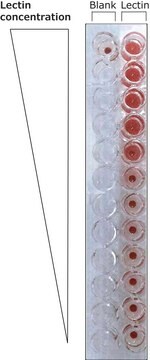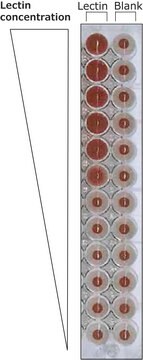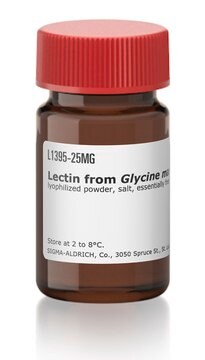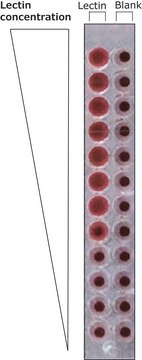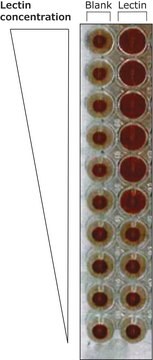L8258
Lectin from Wisteria floribunda
lyophilized powder
Synonym(s):
Wisteria floribunda agglutinin, WFA
Sign Into View Organizational & Contract Pricing
All Photos(1)
About This Item
Recommended Products
form
lyophilized powder
potency
<16 μg/mL agglutination activity
composition
Protein, ~95% E1%/280
storage temp.
−20°C
Looking for similar products? Visit Product Comparison Guide
General description
Lectin is a carbohydrate-binding protein found in plant roots, rhizomes, leaves, seeds, and stems. Lectin is located in the cytoplasm as well as in the nucleus.
Application
Lectin from Wisteria floribunda has been used:
- to study the perineuronal nets and parvalbumin nets in mouse brain by immunofluorescence
- to evaluate the amount of N-acetylgalactosamine (GalNAc) transferred to Gaussia luciferase (GLuc) substrates by microplate assay
- to study its binding effects on perineuronal nets
Biochem/physiol Actions
Lectin binds with high affinity to the glycans of polysaccharides, glycolipids, and glycoproteins. It is involved in plant defense.
WFA is not blood group specific, but has an affinity for N-acetyl-D-galactosamine.
Packaging
Package size based on protein content
Analysis Note
Agglutination activity is expressed in μg/ml and is determined from serial dilutions in phosphate buffered saline, pH 6.8, of a 1 mg/ml solution. This activity is the lowest concentration to agglutinate a 2% suspension of human blood group A erythrocytes after 1 hr incubation at 25 °C.
Storage Class Code
11 - Combustible Solids
WGK
WGK 3
Flash Point(F)
Not applicable
Flash Point(C)
Not applicable
Personal Protective Equipment
dust mask type N95 (US), Eyeshields, Gloves
Certificates of Analysis (COA)
Search for Certificates of Analysis (COA) by entering the products Lot/Batch Number. Lot and Batch Numbers can be found on a product’s label following the words ‘Lot’ or ‘Batch’.
Already Own This Product?
Find documentation for the products that you have recently purchased in the Document Library.
Nausicaä Lannoo et al.
Frontiers in plant science, 5, 397-397 (2014-08-29)
Plants are under constant attack from pathogens and herbivorous insects. To protect and defend themselves, plants evolved a multi-layered surveillance system, known as the innate immune system. Plants sense their encounters upon perception of conserved microbial structures and damage-associated patterns
Markus Morawski et al.
Philosophical transactions of the Royal Society of London. Series B, Biological sciences, 369(1654), 20140046-20140046 (2014-09-17)
Perineuronal nets (PNs) in the brains of tenascin-R-deficient (tn-r(-/-)) mice develop in temporal concordance with those of wild-type (tn-r(+/+)) mice. However, the histological appearance of PNs is abnormal in adult tn-r(-/-) mice. Here, we investigated whether similar defects are also
Our team of scientists has experience in all areas of research including Life Science, Material Science, Chemical Synthesis, Chromatography, Analytical and many others.
Contact Technical Service